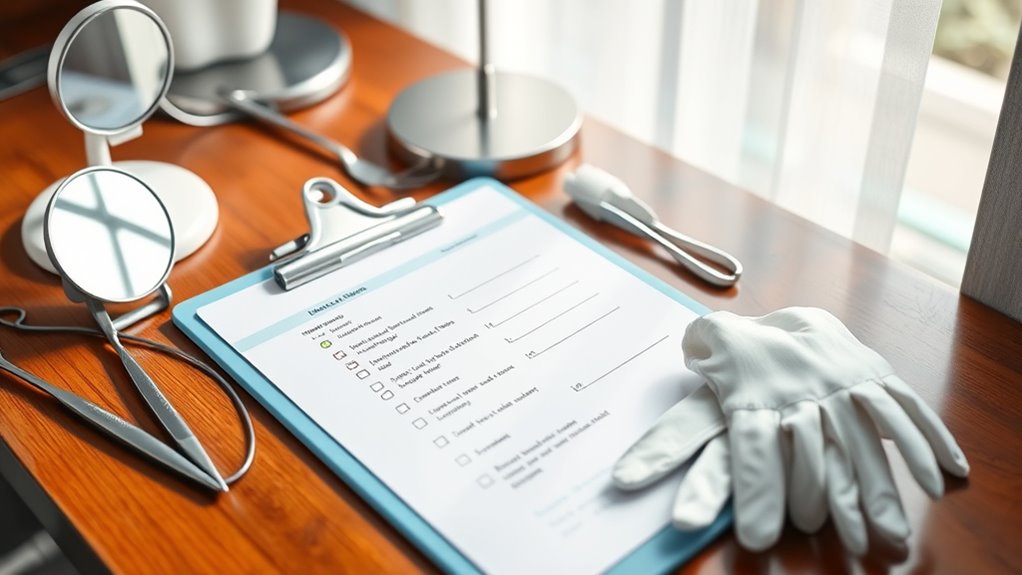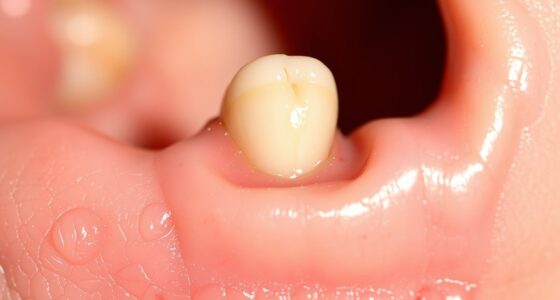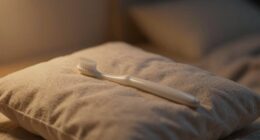To prepare for your mid-summer dental check-up, review your oral hygiene routine to guarantee you’re flossing and using mouthwash correctly. Gather your dental history and questions to discuss any concerns like sensitivity or whitening. Look out for signs of dental issues such as bleeding gums or dark spots on teeth. Confirm your appointment details and set reminders. Staying proactive helps keep your smile healthy; explore further tips to make the most of your visit.
Key Takeaways
- Review and reinforce your daily oral hygiene routine, including proper brushing, flossing, and mouthwash use.
- Prepare your dental history, list questions, and organize documents for your appointment.
- Check for early signs of dental issues like gum inflammation, cavities, or sensitivity.
- Confirm your appointment date and time, and set reminders to ensure timely attendance.
- Stay proactive with regular dental visits and professional advice to maintain optimal oral health.
Review Your Oral Hygiene Routine
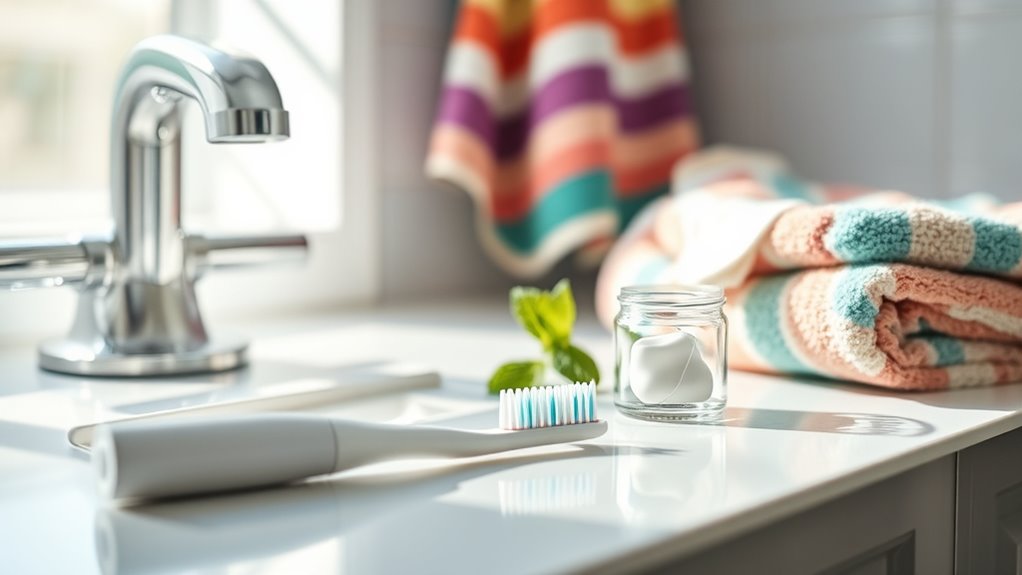
Have you been consistent with your oral hygiene routine? It’s essential to evaluate your daily habits to guarantee ideal dental health. Start by reviewing your flossing techniques—make sure you’re using gentle, thorough motions to remove plaque between teeth without causing damage. Proper flossing is key to preventing cavities and gum disease. Next, consider your mouthwash selection; choose a product that targets your specific needs, whether it’s anti-gingivitis, anti-cavity, or freshening breath. Swishing with mouthwash complements brushing and flossing, reaching areas your toothbrush might miss. If your routine feels rushed or inconsistent, now’s the time to refine it. Regular, mindful practices will keep your mouth healthier and reduce the need for extensive dental work down the line. Incorporating professional guidance can also help ensure your technique is effective and safe.
Prepare Your Dental History and Questions

Reviewing your oral hygiene routine helps you identify areas for improvement, but being prepared for your dental visit guarantees all concerns are addressed. Start by gathering your dental history, including past treatments, allergies, and any ongoing issues. This preparation not only streamlines your appointment but also ensures that your dental records are up to date, facilitating better diagnosis and care. Also, prepare a list of patient questions about concerns like whitening, sensitivity, or specific symptoms. To visualize, consider this table:
| Dental History | Patient Questions |
|---|---|
| Past cavities or gum issues | How can I improve my whitening routine? |
| Medications affecting oral health | Are my sensitivity issues normal? |
| Previous treatments or surgeries | When should I schedule my next check-up? |
Being organized ensures a productive visit and peace of mind.
Check for Signs of Dental Issues

To effectively detect dental problems early, you should actively look for common signs of issues during your check-up. Watch for gingivitis signs, such as red, swollen gums, bleeding while brushing or flossing, or persistent bad breath. These are early indicators that your gums may be inflamed or infected. Additionally, check for cavity indicators like dark spots, white spots, or holes on your teeth, which suggest decay. Sensitivity to hot, cold, or sugary foods can also signal underlying cavities. Pay attention to any discomfort or pain, especially when biting or chewing. Recognizing these signs early helps your dentist address problems before they worsen. Being aware of these symptoms ensures you stay proactive in maintaining your oral health. Exploring best anime movies can also provide enjoyable ways to relax and reduce stress, which benefits overall health.
Schedule and Confirm Your Appointment Details
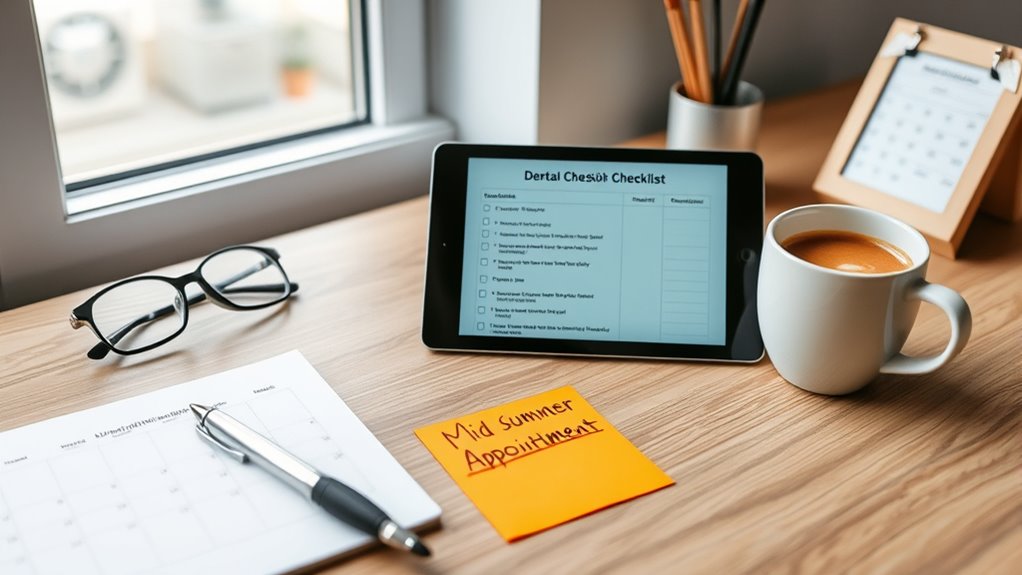
Scheduling and confirming your dental appointment guarantees you stay on top of your oral health. Double-check the date and time, and set up a reminder to avoid forgetting. An appointment confirmation helps ensure your schedule stays on track, preventing last-minute surprises. To stay organized, consider the following:
| Action | Tip |
|---|---|
| Confirm appointment | Call or email your dentist to verify details |
| Set reminder | Use your phone or calendar app |
| Reschedule if needed | Notify your clinic early |
| Add to calendar | Mark the date prominently |
| Prepare documents | Bring insurance info and previous records |
Additionally, ensuring your appointment details are accurate can help improve the overall experience and reduce the risk of scheduling conflicts. Taking these steps guarantees your appointment is locked in and your reminder setup ensures you won’t miss your check-up.
Frequently Asked Questions
How Often Should I Replace My Toothbrush?
You should replace your toothbrush every three to four months, depending on the toothbrush’s lifespan and your dental hygiene habits. Over time, toothbrush bristles fray and become less effective at cleaning your teeth. If you’ve been sick or notice worn bristles sooner, swap it out sooner. Regular replacement guarantees you maintain good dental hygiene habits and prevents bacteria buildup, keeping your mouth healthy and fresh.
Are There Specific Foods That Harm My Dental Health?
Think of your teeth as a battleground, where certain foods can be sneaky invaders. Foods high in sugar and acids, like candy or soda, cause cavity-causing snacks and food stains. These harmful treats weaken enamel and promote decay, making your teeth vulnerable. To protect your smile, limit these foods and opt for crunchy fruits or vegetables instead. Regular brushing and dental check-ups help keep your teeth strong and resilient against these threats.
What Should I Do if I Experience Dental Pain Before My Check-Up?
If you experience dental pain before your check-up, don’t ignore it. You should seek emergency care if the pain is severe, sharp, or persistent. For tooth sensitivity, try avoiding hot, cold, or sugary foods, and use a desensitizing toothpaste. Over-the-counter pain relievers can help, but see your dentist promptly to address the cause and prevent further issues. Acting quickly guarantees your comfort and oral health.
Do I Need to Disclose Any Medications I’M Taking?
You should definitely disclose any medications you’re taking to your dentist. It’s important because some medications can have side effects like dry mouth or bleeding issues, and others might interact with dental treatments. Sharing this info helps prevent drug interactions and ensures your care is safe and effective. Be honest about all prescriptions, over-the-counter drugs, and supplements so your dentist can provide the best advice and treatment plan.
How Can I Improve My Flossing Technique Effectively?
To improve your flossing technique effectively, focus on proper flossing technique and maintaining the right flossing frequency. Gently slide the floss between your teeth, curving it around each tooth in a C-shape, and move it up and down to remove plaque. Do this daily, ideally once a day, to keep your gums healthy. Consistent, gentle flossing enhances cleanliness without causing damage, making your oral care routine more effective.
Conclusion
Now that you’ve gone through your mid-summer dental check-up checklist, you’re all set for a healthy smile. By reviewing your routine, preparing questions, and confirming appointments, you’re taking charge of your dental health. Isn’t it worth the peace of mind to know your smile is shining bright? Keep up these simple steps, and you’ll enjoy a confident, radiant smile all season long. After all, your teeth deserve the best care—are you ready to make it a priority?
